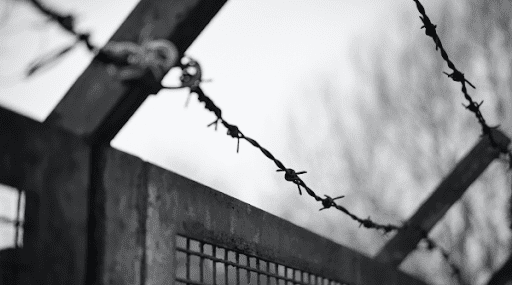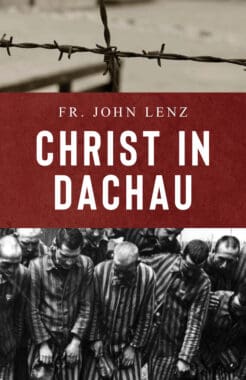It was July 2, 1945, at eight o’clock in the evening. It was time to lock the doors of the shrine for the night, and as I came out of the chapel, I saw that it was raining—soft, summer rain, cool and refreshing after the heat of the day. It was almost symbolic, I thought, as I walked back through the rain to the house where I was staying, my mind filled with memories of the past dark years from which we had been so mercifully delivered by the grace of God and His Holy Mother. All through those six nightmare years spent in Dachau, I had never ceased to trust and hope in Our Lady, and I had made a solemn vow then to make a pilgrimage to her shrine at Altötting if I ever came out alive. I did come out alive, and my first visit outside the camp was to Altötting in Lower Bavaria, a fitting place for such an act of thanksgiving, for it is one of the oldest and most honored shrines of Our Lady in the whole of Christendom.
For centuries, Christian pilgrims have made their way here to lay their troubles and their joys, their special petitions. and intentions, before the Mother of God. Convinced that she would help them, they were never disappointed. The countless inscriptions on the walls, both inside and outside this holy place, and the many votive paintings are proof enough of that. “Our Lady, come to our aid!” “Mary will never fail us!” “Our Lady, Refuge of Sinners!” These words found an echo in my own heart, for I knew what Our Blessed Mother had been to us in the horror of Dachau, and I was quite convinced that it was through her intercession that I had come out alive.
It was hard to believe in those tranquil summer days that the dark satanic era of Nazi domination that had plunged Europe into war and misery for so long was over at last. Hitler’s regime of terror and godlessness had finally been broken. Christ had triumphed over the powers of Hell. We of His Church had never doubted that He would emerge victorious in the end, but the way to victory had often seemed intolerably long and hard, a veritable Way of the Cross for those of us who suffered the horrors, the privations, and the sheer grey monotony of life in a Nazi concentration camp. There were, in fact, not very many who did survive the experience in comparison with the countless thousands who died. For those of us who came out alive, our survival was indeed a miracle. Mary had come to our aid, and it was only right and fitting that I should come to honor her in humble thanksgiving at her great shrine.
I shall never forget those long, peaceful summer days in Altötting, days of quiet prayer and meditation, days of rest after the strain of six long years behind barbed wire and the strenuous weeks that had followed our liberation by the Americans. There had been much to do in the camp in those days, for an almost superhuman task of organization had awaited us in helping the authorities to cope with the chaos in the camp. It had taken weeks to effect the discharge of the prisoners, but there were still many who were homeless or destitute or too sick to be moved, and my days had been filled in helping to care for them. I could see that it would take weeks, perhaps even months, before they were cleared, and I knew that they could not be left without a priest.
“Come back to us after your pilgrimage to Altötting, Father,” beseeched one old man who was dangerously ill. “You’ve just got to come back! You can’t leave us alone!”
So I went back to Dachau after a few days, refreshed and strengthened by my stay in Altötting. I was very impressed by what I saw there, by the countless groups of devout pilgrims led by priests and religious, fine men and women who had no illusions about the mammoth task confronting them of helping to build up a new Germany and a new Austria out of the shambles left by the war, but who were confident of God’s help and, above all, fired with enthusiasm and zeal for the work that lay ahead. I knew only too well from experience how much depended on the spiritual qualities of our priests and religious as fearless champions of Christ and servants of His Church here on earth. I came away from Altötting reassured and strengthened by the knowledge that we had priests and religious of this caliber to lead our people along the road to God. I thought back to the dark days of the rise of the Nazi party and the spread of its godless doctrines.
There had been intrepid champions of the truth in those days too, but we could have done with more. If our Catholic Faith had really been something living, something vital to our very existence, it is doubtful whether even a proportion of our people would have fallen prey to the Nazi pseudo-religion. We had been too lukewarm; our religion had become something conventional and had lost its living quality, so it was easy for many to lose sight of the essential values, to become blind to truth. So much depends on our leaders, the men and women who are Christ’s servants as priests and religious, whose duty it is to fire those in their care with a new enthusiasm for Christ, to keep His teachings perpetually before their eyes, to strengthen, uphold, and protect, so that their flock should never again lose sight of the eternal truths manifested in the teachings of the Church.
+
This article on “Priest Who Survived Nazi Camp Reflects” is adapted from the book Christ in Dachau by Fr. John Lenz which is available from Sophia Institute Press.
Art for this post on a reflection from “Christ in Dachau” by Fr. John Lenz: Cover image used with permission; Featured image by Ed Hinchliffe on Unsplash.






